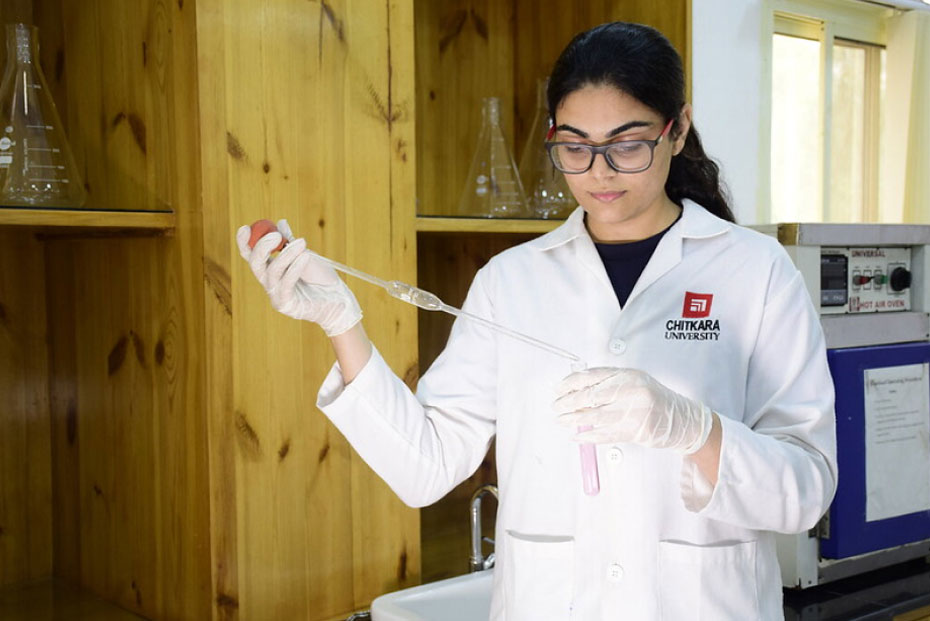Chitkara College of Pharmacy’s M. Pharm program prepares students for leadership in healthcare and pharmaceutical sciences. This 2-year full-time program combines theoretical and practical training, equipping students for roles in research, industry, and academia.
For this academic year, we are offering the following 2-Year Master’s Degree programs:
M. PHARM (PHARMACEUTICS) +
The M. Pharm (Pharmaceutics) program leads to specialisation in formulation development, manufacturing technology, and process development areas, which are essential Specialisation for manufacturing of traditional and novel drug delivery systems. The first year involves theoretical and practical sessions in the following areas: dosage form design; advanced pharmaceutical methods of analysis; drug regulatory affairs; biopharmaceutics and pharmacokinetics; dosage form technology; advances in industrial Pharmacy; and novel drug delivery systems. The second-year projects touch upon formulation development, stability studies, and process validation for traditional and novel drug delivery systems.
Some of the areas that have been taken up by various batches since 2009, include, Hydrogels, Micro emulsions, Microspheres, Nano spheres, Nano suspensions, Gastroretentive Systems, solid-solid and solid-liquid Dispersed Systems, and development of Modified Excipients.
Continuous interaction with industries including Nectar Life Sciences, Abbott Healthcare, Unichem, Jubilant Clinsync, Arbro Pharma, Dr. Reddy’s Labs and other organisation for academics, conferences and placements is a special feature during the course.
M. PHARM (PHARMACOLOGY) +
This program leads to specialisation in pharmacology, which is an integral part of the drug discovery and drug design processes. These processes deal with the identification of lead molecules that could have potential therapeutic activity due to specific molecular and receptor affinity, and analogous structure to specific sites and proteins in the body. In the first year, the Program covers theoretical and practical sessions in the subject’s molecular pharmacology; general pathophysiology; pharmacology and Pharmacotherapeutics I and II; clinical research methodologies; advanced pharmaceutical methods of analysis; drug regulatory affairs; quality assurance and biostatistics; and other subjects. In the second year of the program students take-up several projects that are aimed at developing and exploring novel receptor targets, and mechanisms for drug action in the pathophysiological stages of the disease.
M. PHARM (PHARMACY PRACTICE)+
This program offers a specialisation in the clinical drug development methodologies, its regulations, and control. Once the safety and efficacy of a novel chemical entity is established for a drug compound in pre-clinical animal studies, it is put through the process of clinical development. This is where the drug is studied for safety, efficacy and dosing in increasing numbers of human population setting through Phase I–IV clinical trials. The branch offers exposure to subjects on principles of pharmacology and therapeutics; clinical research methodologies; clinical DRUG development; advanced pharmaceutical methods of analysis; drug regulatory affairs; recent advances in pharmacology; quality assurance and biostatistics; and other subjects. The second-year clinical projects are done in hospital inpatient /outpatient settings either in association with a clinical research organisation or a pharmaceutical company.
M. PHARM (DRUG REGULATORY AFFAIRS) +
The Master’s program in Drug Regulatory Affairs is a comprehensive specialisation in pharmaceutical regulations, which are in practice in different countries to ensure validated procedures for Pharma Research, Technology Transfer for Large Scale Continuous Manufacturing Operations, Quality Assurance, Distribution Records, Recall and Pharmacovigilance. A pharmaceutical product has to be approved for safety, efficacy & procedural compliance & documentation for marketing in the US by USFDA, in the UK by MHRA, in Europe by EMEA, in Japan by PMDA, in India by CDSCO & similarly for other countries. The course gives details of the structures of these organisational procedures & guidelines to submit documents & dossiers and follow up with these regulatory agencies in the form of DMF, CMC documents, CTD & CTD documents. The professionals with M. Pharm Drug Regulatory Affairs specialisation are mandatory & highly paid.
M. PHARM (Pharmaceutical Chemistry) +
This comprehensive two-year post-graduate program focuses on pharmaceutical research & development, with specialised training in drug design and synthesis/analysis of novel and natural compounds. The curriculum blends theoretical education & hands-on laboratory experience, equipping students to tackle industry challenges with an A understanding of advanced drug techniques.
This course presents extensive career prospects in Research and Development, Quality Control, Analytical Research and Development, Regulatory Affairs, Medical Writing, Pharmacovigilance, and various other healthcare-related fields.
Specialising in Pharmaceutical Chemistry, this program delves into the intricate world of medicinal chemistry and its pivotal role in the discovery and development of drugs. Students gain advanced proficiency in organic chemistry. biochemistry, chemical analysis, and pharmaceutical formulation, cultivating a strong foundation for a career in the pharmaceutical industry.
M. Pharm in Pharmaceutical Chemistry graduates are in high demand and have access to a multitude of opportunities, including Medicinal Chemist, Analytical Chemist, Formulation Scientist, Quality Assurance Specialist, Research Scientist, Pharmaceutical Sales and Marketing, Regulatory Affairs Specialist, and positions in academia.
This program fosters a deep understanding of medicinal chemistry, equipping you with a solid knowledge base in organic chemistry, biochemistry, and pharmaceutical formulation. With diverse career options in academia and roles such as Medicinal Chemist, Analytical Chemist, graduates of this program are well-positioned for success in the dynamic pharmaceutical industry.
M. Pharm (Pharmaceutical Analysis) +
The Master’s program in Pharmaceutical Analysis is a meticulously designed course of study that leads to specialisation in the qualitative and quantitative assessment of substances, from raw materials to finished drug products. This specialisation serves as the foundation of drug discovery, development and quality assurance, ensuring the safety, efficacy and stability of both conventional medicines and innovative new therapeutic agents. The curriculum combines theoretical education with hands-on laboratory experience, preparing students to address industry challenges using advanced drug analytical techniques.
During the initial year, students engage in an extensive curriculum that merges theoretical knowledge with practical applications, covering a broad range of topics including Modern Pharmaceutical Analytical Techniques, Advanced Instrumental Analysis, Drug Development Process, Food and Cosmetic Analysis, Quality Control and Assurance, Bioanalytical Techniques and Stability Testing and Validation.
In the second year, students participate in immersive research projects focusing on the key elements of Method Development and Validation, Impurity Profiling, Stability-Indicating Assay Methods and Bioanalytical Method Development, tailored specifically to meet the stringent demands of the global pharmaceutical industry and regulatory standards.





























